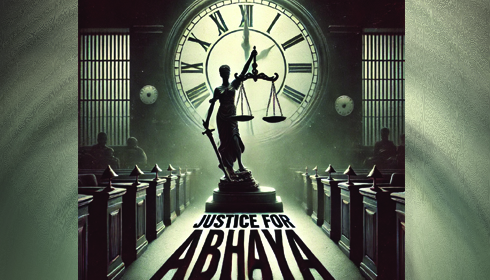
RG Kar Protest Revives: Doctors Demand Justice Amid Lingering Questions
Two months after the junior doctors' hunger strike at Dorina Crossing in Dharmatala, the spotlight has once again returned to the RG Kar Medical College protest. This time, members of the West Bengal Joint Platform of Doctors and Abhoya Mancha have joined forces to demand justice in the controversial RG Kar incident. The agitation, which began after obtaining permission from the Kolkata High Court, is set to continue until December 26.
The junior doctors have called this protest a movement for everyone, urging the public to express their dissent in their own ways. Debashis Halder, a prominent voice in the movement, addressed the gathering, emphasizing inclusivity:
"Many are wondering why we are not protesting actively. This is everyone's fight. Everyone must raise their voice in their own way."
The demonstration witnessed support from several citizens on Saturday, though the energy seemed relatively subdued compared to the hunger strike two months ago. Protest organizers, however, expressed optimism, stating that participation is expected to grow as the days progress.
Despite 90 days having passed since the RG Kar incident, the CBI has yet to file a supplementary charge sheet in the Sealdah Court. This delay has led to bail being granted to two key accused: Abhijit Mondal, former OC of Tala Police Station, and Sandeep Ghosh, former principal of RG Kar Medical College. Protesters are demanding immediate action from the CBI and state government, specifically urging the inclusion of charges against Sandeep Ghosh in the charge sheet.
The path to the current protest was not without hurdles. Kolkata Police initially denied permission for the sit-in, citing potential traffic disruptions during Christmas and New Year celebrations. In response, the doctors approached the High Court, which granted them conditional approval to stage the demonstration. Following the court's directive, the protest began late Friday night, with a stage being set up at Dorina Crossing.
While the protest echoes the momentum of the October hunger strike, questions remain about its ability to galvanize the same level of public engagement. Organizers are working to give the movement a more structured form, hoping to draw attention to the larger issues of justice, accountability, and systemic reform.
This renewed agitation underscores a pressing reality: the RG Kar case has become a litmus test for both the judicial process and the resilience of grassroots activism in Bengal. Whether these efforts translate into tangible outcomes remains to be seen.